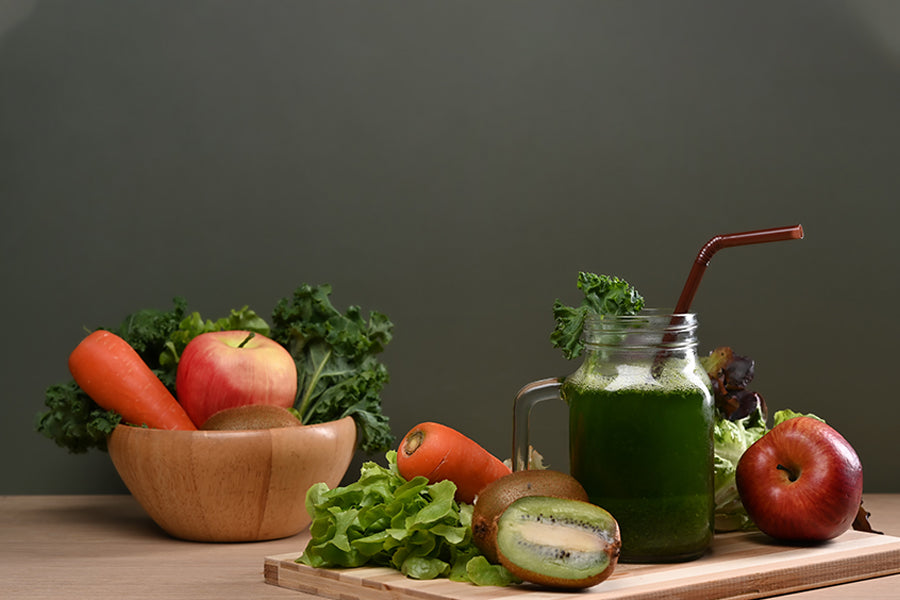Imagine standing in front of a pantry filled with various food options, scratching your head, and wondering how to jazz up your diet with the mystical powers of electrolytes. It's like trying to solve a Rubik's Cube while blindfolded!
But fear not, fellow culinary explorers, because we're here to sprinkle some humor into this electrifying quest. Think of electrolytes as the superhero squad of the nutrition world, ready to swoop in and save the day. They're like the Avengers but with fewer capes and more sodium!
Incorporating electrolytes into your diet naturally is like mastering a magic trick. It's about finding the right ingredients, mixing them in the perfect proportions, and creating a culinary masterpiece that will leave your taste buds joyful.
So, let's wave our chef hats and embark on this adventurous journey together. We'll dive into the world of potassium-packed bananas, where every bite is like a tickle of potassium magic.
We'll explore the depths of leafy greens, where calcium and sodium hide in plain sight, ready to give your body a high-five of mineral goodness. But wait, there's more! We'll also uncover the secrets of homemade electrolyte-infused drinks, where you can become the mixologist of hydration.
Shake up a potion of coconut water, a squeeze of citrus, and a pinch of salt, and voila! You've made a thirst-quenching drink that would make even Harry Potter jealous. So, my brave adventurers, get ready to taste the magic and unleash your inner electrolyte wizard! Abracadabra, let's begin!
Why Should You Incorporate Electrolytes in Your Diet?
Electrolytes are crucial in maintaining water balance within the body, facilitating nerve responses and muscle contractions. However, the risk of electrolyte deficiency arises after intense workouts or during illnesses accompanied by symptoms like vomiting and diarrhea.
Severe imbalances can give rise to muscle cramps, weakness, heart arrhythmia, paralysis, and, in extreme cases, even cardiac arrest. Among the notable electrolytes, sodium, and potassium stand out for regulating fluid balance within and outside cells.
Additional essential electrolytes include chloride, phosphorus, calcium, and magnesium. It is noteworthy that strenuous physical exertion and illness can lead to significant sodium loss, underscoring the significance of replenishing electrolytes to restore balance.
How to Get Electrolytes Naturally?
You can quickly fulfill your body's electrolyte requirements solely through dietary choices. Below are a variety of foods and beverages that can assist in replenishing your electrolyte reserves.
Drink Unsweetened Coconut Water
Coconut water, a popular alternative to regular bottled water, can be a great source of potassium. Just one cup of coconut water contains around 350 mg of potassium, about 13% of your recommended daily intake.
The best part is that you can easily find coconut water at most grocery and convenience stores. So, coconut water is a convenient and tasty option to replenish your electrolytes and enjoy a refreshing drink.
Eat Bananas

Bananas are an excellent natural source of electrolytes, primarily due to their rich potassium content. With approximately 422 mg of potassium in a typical banana, it provides about 16% of your recommended daily value (DV) for this essential mineral.
To make your banana snack even more nutritious, you can enhance its benefits by adding a dollop of peanut butter for a protein boost or incorporating it into your oatmeal for added fiber.
You can also incorporate DMoose Whey Protein Powder in your routine for added protein boost and muscle fiber. DMoose Whey Protein is a top-notch supplement that plays a crucial role in supporting protein synthesis and promoting the growth and repair of muscle fibers.
It is packed with high-quality whey protein isolate and provides the essential amino acids to fuel muscle recovery and stimulate muscle protein synthesis.
By incorporating DMoose Whey Protein into your fitness regimen, you can ensure that your muscles receive an adequate supply of protein to facilitate muscle tissue repair and growth.
This versatile fruit offers a delicious taste and provides a convenient way to replenish electrolytes and enhance the nutritional value of your meals and snacks.
Consume Dairy Products
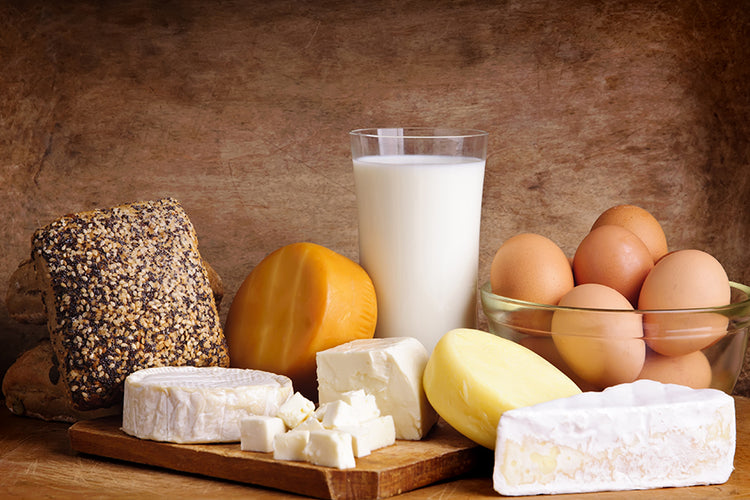
Dairy products offer a fantastic combination of calcium and sodium, making them valuable sources of essential electrolytes.
In just 100 mL of milk, you can find approximately 199 mg of calcium (equivalent to 20% of the recommended daily value) and 281 mg of potassium (around 10% DV).
Cheese takes it a step further, with one ounce of parmesan cheese providing roughly 336 mg of calcium (33% DV) and 26.1 mg of sodium (2% DV).
While dairy products are commonly associated with calcium, other noteworthy sources include collard greens, beans, soy products, almonds, tahini, and bok choy.
For a delightful snack that combines sodium and calcium, consider adding a slice of cheese to a piece of almond flour bread. This way, you can enjoy a tasty treat while benefiting from the electrolytes provided by these nutrient-rich foods.
Spinach
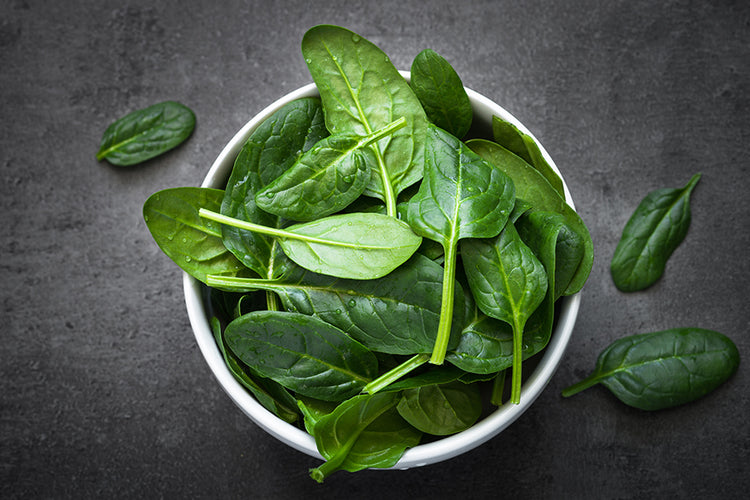
Spinach is a powerhouse regarding electrolytes, particularly calcium and magnesium. Just one cup of cooked spinach can provide around 24% of the recommended daily calcium intake and a whopping 73% of magnesium for adults.
In addition to being rich in electrolytes, spinach is packed with other valuable nutrients like vitamins A, and K.
Pickle Juice
Pickle juice has gained popularity, and scientific backing is behind its growing trend. This tangy juice is loaded with sodium and chloride, known as electrolytes. The high sodium content in pickle juice may help reduce the duration of muscle spasms after intense workouts. However, it's essential to be mindful of your sodium intake as excessive amounts can lead to health complications, including high blood pressure.
Eat Avocado
Avocados go beyond being a trendy fruit; they are an amazing natural source of potassium. A standard-sized avocado contains approximately 660 mg of potassium, about 22% of the recommended daily value (DV).
Enjoy avocados atop toast with a sprinkle of cheese for a delicious, electrolyte-rich snack or breakfast. This combination adds a delightful twist to your meal and provides a nutritious boost of essential electrolytes.
Cook White Meat and Poultry
White meat and poultry are excellent dietary sources of electrolytes that can help replenish your body's mineral levels. For instance, in 100g of white turkey meat, you can find approximately 349 mg of potassium, contributing to around 12% of the recommended daily value (DV), and 1200 mg of sodium, accounting for about 52% of the DV.
In addition to white meat, other food sources rich in electrolytes like zinc include shellfish, beans, lentils, and hemp seeds. Incorporating these nutrient-packed foods into your diet ensures a healthy electrolyte intake while enjoying various flavors and nutritional benefits.
Legumes
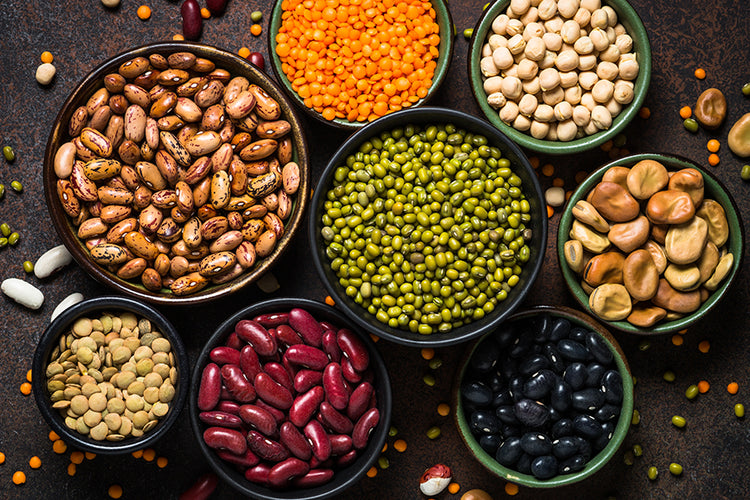
Legumes, such as lentils, are a fantastic source of electrolytes. These versatile legumes offer a rich supply of essential electrolytes like magnesium, potassium, and phosphorus.
In addition to their electrolyte content, lentils also provide a good amount of protein, making them a nutritious and well-rounded addition to your diet.
Dried Apricots
Dried apricots fit the bill if you want a tasty and nutrient-rich snack. These sweet treats are packed with goodness, including a lot of potassium. Consuming just half a cup of dried apricots can contribute nearly a quarter of the recommended daily value of potassium for adults, helping to replenish your electrolyte levels.
Sunflower Seeds
Nuts and seeds are excellent sources of magnesium, a crucial electrolyte. Sunflower seeds, in particular, stand out as they also provide a good dose of phosphorus. By snacking on sunflower seeds, you get the benefits of magnesium and multiple electrolytes, making it a crunchy and nutritious choice for boosting your electrolyte intake.
Eat Watermelon
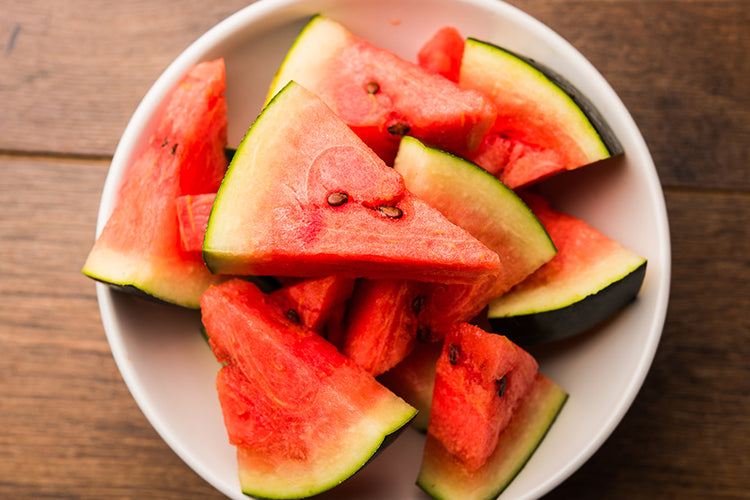
Watermelons are not just a summertime treat; they can be enjoyed throughout the year for a refreshing electrolyte boost. Snacking on watermelons provides a medium-sized wedge that contributes around 320 mg of potassium, accounting for approximately 11% of this essential electrolyte's recommended daily value (DV).
In addition to their potassium content, watermelons are known for their hydrating properties, containing about 92% water. This makes them an excellent post-workout snack to replenish fluids and support hydration.
So, regardless of the season, indulge in watermelons' juicy and hydrating goodness to enjoy their electrolyte benefits and quench your thirst with a delicious and nutritious snack.
Drink Fruit Juice
While various juices like oranges, lemonade, and banana offer electrolytes, one standout contender is pomegranate juice. This fruity beverage serves as an excellent source of electrolytes, providing approximately 533 mg of potassium in a single cup, which accounts for about 18% of the recommended daily value (DV).
Enjoy a refreshing glass of pomegranate juice with your breakfast or as a mid-afternoon pick-me-up to benefit from its electrolyte content. However, it's essential to be mindful of your overall sugar intake. Opt for 100% fruit juice options to avoid excessive added sugars while still reaping the electrolyte benefits.
DMoose EAA Hydration
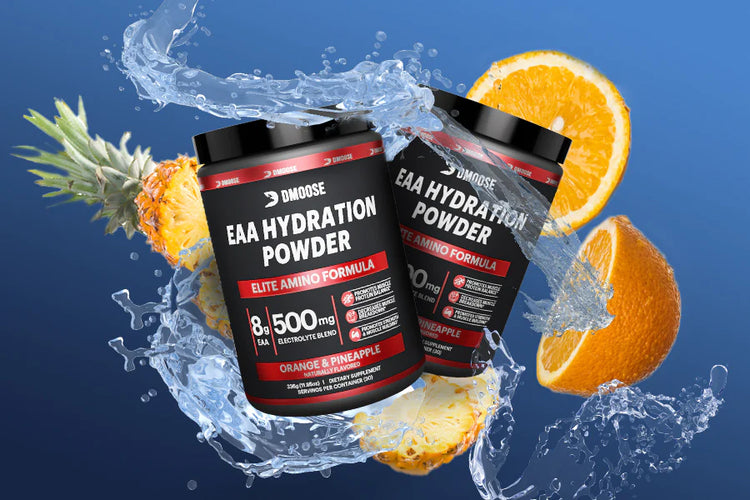
DMoose EAA Hydration is a premium hydration supplement designed to replenish and hydrate your body effectively. Packed with essential amino acids (EAAs) and electrolytes, it provides a comprehensive blend of nutrients to support optimal hydration levels.
By incorporating DMoose EAA Hydration into your daily routine, you can ensure that your body stays well-hydrated, helping to maintain fluid balance and support various bodily functions.
The electrolytes in this supplement play a crucial role in regulating hydration, muscle contractions, and nerve impulses. Additionally, the EAAs support muscle recovery and overall health. With its convenient and delicious flavors, DMoose EAA Hydration makes hydrating your body a refreshing and enjoyable experience.
Related Article: Is Fruit a Good Pre-Workout Snack? - Explained
How Many Electrolytes Do I Need?
Here is a table showcasing the recommended daily allowances of five common electrolytes for adults, as the required amounts may vary depending on age, gender, and physical activity levels:
|
Electrolyte |
Recommended Daily Allowance |
|
Sodium |
1500-2300 mg |
|
Potassium |
2000-3500 mg |
|
Calcium |
1000-1300 mg |
|
Magnesium |
310-420 mg (men), 255-320 mg (women) |
|
Chloride |
2300-3600 mg |
These values are general recommendations and individual needs may vary. It is advisable to consult with a healthcare professional or registered dietitian to determine the specific electrolyte requirements based on your age, gender, and physical activity level.
Related Article: How Hydration Reduces Risk of Chronic Diseases and Early Death?
DMoose Electrolyte Capsules

DMoose Electrolyte Capsules are an excellent choice for individuals who lead active lifestyles or have increased electrolyte needs. These capsules offer a convenient alternative to traditional sports drinks and allow you to customize your electrolyte intake according to your specific requirements.
Each capsule contains a blend of essential electrolytes, including sodium, potassium, calcium, and magnesium, which are vital for proper hydration and muscle function. With DMoose Electrolyte Capsules, you can easily replenish and maintain optimal electrolyte levels, ensuring your body stays adequately hydrated and primed for peak performance.
Incorporate DMoose Electrolyte Capsules into your daily routine and stay on top of your electrolyte game for enhanced performance and well-being.
Related Article: How Hydration Supplements Supercharge Your Workouts?
FAQs
1. What are the top 10 foods high in electrolytes?
Some top foods high in electrolytes include bananas, spinach, avocados, coconut water, yogurt, nuts and seeds, beans and lentils, salmon, citrus fruits, and tomatoes.
2. How can I replace electrolytes quickly?
You can replace electrolytes quickly by consuming electrolyte-rich foods and beverages such as sports drinks, coconut water, electrolyte powders or tablets, and foods like bananas, oranges, and leafy greens.
Additionally, you can consider electrolyte supplements for faster replenishment, such as DMoose electrolyte capsules or EAA hydration supplements.
3. Which foods are high in electrolytes?
Foods high in electrolytes include fruits like bananas, oranges, and melons; leafy greens like spinach and kale, dairy products like milk and yogurt; proteins like white meat, shellfish, and beans; and certain seeds and nuts.
4. What happens when your body is low on electrolytes?
When your body is low on electrolytes, it can prompt symptoms such as muscle cramps, fatigue, weakness, dizziness, irregular heartbeat, and even more severe complications if left untreated. It is important to maintain proper electrolyte balance for optimal bodily function.
5. How can I get electrolytes in water?
You can add electrolytes to water using electrolyte-enhanced water or electrolyte powders or drops specifically designed for water. These products can be easily mixed into your water to provide the necessary electrolyte content for hydration and replenishment.
Conclusion
Incorporating electrolytes into your diet naturally is important to maintaining a healthy balance. You can ensure an adequate intake of these essential minerals by including electrolyte-rich foods like bananas, leafy greens, legumes, and dried apricots.
Additionally, homemade electrolyte-infused drinks offer a refreshing and customizable way to stay hydrated. Remember that electrolytes are vital in regulating fluid balance and supporting muscle function.
So, prioritize including electrolyte-rich options in your daily meals and beverages to support your overall well-being.









